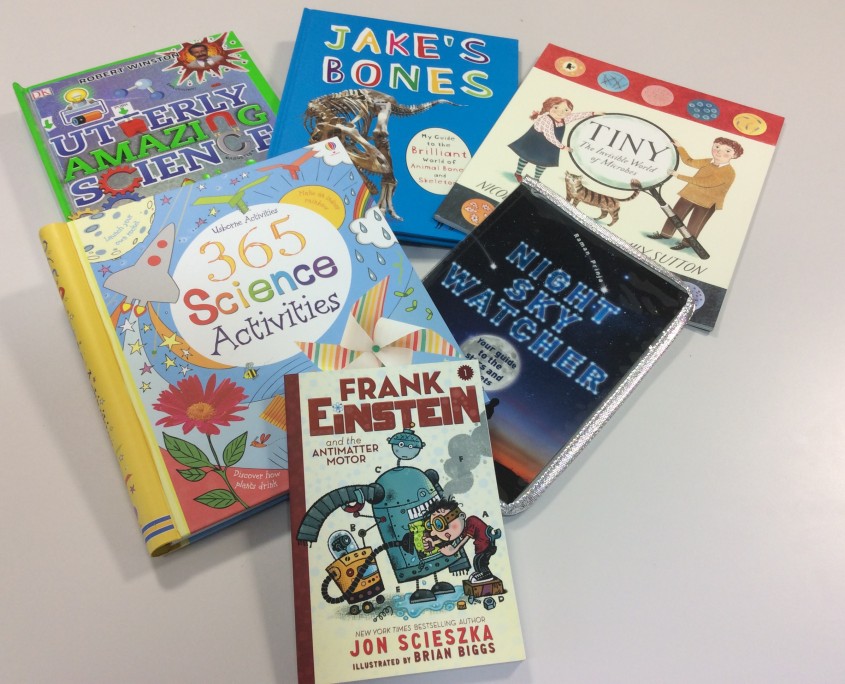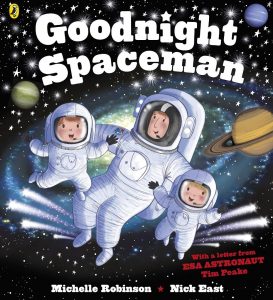As Christmas comes rapidly nearer, family members might be asking what children would like for Christmas. Books are often popular (particularly with more distant relatives). But what to buy?
For children who are curious and interested in the world around them, the books from the Royal Society Young People’s book prize could be ideal. Science books which are aimed at under-14s are considered and then a shortlist of 6 books is chosen. This year’s shortlist was announced before the summer holiday, and then panels of school children around the country read and judged the books. They sent their comments and verdicts to the Royal Society, and the winner was announced on Monday 16th November.

The 2015 shortlisted books for the Royal Society Prize
A number of our partner secondary schools took part in the judging, with books clubs made up of years 7 and 8 reading the books and discussing the good (and bad) points. One school, Cramlington Learning Village, has shared their comments on the books to help you choose which would be the most interesting to read. Here are some of their thoughts…
365 Science Activities
- This book is a bit big to use – but also allows the author to fit in even more activities to keep the reader busy and entertained! There’s a limited amount of scientific vocabulary and the experiments could maybe have been more organised into different sections or themes. — Laura, 11
- Very colourful and packed with fun things to do. — Josh, 11
- Eye-catching and great fun. Love the idea of an activity for every day of the year. — Lily, 12
- The illustrations make the experiments look even more exciting and tempting and the language is just right. I learnt a lot! — Chelsea, 12
- I love doing experiments but even so I learnt a lot of new stuff from this book. — Rachel, 11
Published by Usborne, ISBN 978-1409550068 | Goodreads page, Google Books | Buy from Amazon UK, Waterstones, AbeBooks, or your local bookshop.
Frank Einstein, by John Scieszka, illustrated by Brian Biggs
- More aimed at older ages, this story about a child-genius is written well with lots of pictures, facts – and humour! The illustrations made me want to open the book and I’m pleased I did. It hooked me in and the plot was so interesting I found it hard to put the book down. An amazing and very clever combination of facts and story. — Ayesha, 12
Website | Published by Amulet, ISBN 978-1419712180 | Goodreads page, Google Books | Buy from Amazon UK, Waterstones, AbeBooks, or your local bookshop.
Jake’s Bones, by Jacke McGowan-Lowe
- Easy to use because of the combination of arrows and text. — Grace, 11
- The bright, clear pictures guide you through the facts in the book. The picture of the dinosaur skeleton really made me want to read and find out more! — Oliver, 11
Website | Published by Ticktock, ISBN 978-1783250257 | Goodreads page, Google Books | Buy from Amazon UK, Waterstones, AbeBooks, or your local bookshop.
Night Sky Watcher, by Raman Prinja
- A very interesting and educational book. — Josh, 11
- The interesting images make this book inviting and all the facts are very clearly explained. Also, it has a zip and that’s unusual in a book! Fun and entertaining for ages 9-90. — Amy, 11
- The zip made me want to open this book! It was educational as well as great fun. All the difficult, scientific words are well-explained making this an easy book to read and dip in and out of, with clear signposting. — Rebecca, 12
- Very easy to find out what’s where in the book which is written like a huge factfile. It’s fabulous (I love the zip!!) — Bethany, 12
Published by QED, ISBN 978-1781716571 | Goodreads page, Google Books | Buy from Amazon UK, Waterstones, AbeBooks, or your local bookshop.
Tiny, by Nicola Davies, illustrated by Emily Sutton
- Easy to read with big, colourful illustrations. — Beth, 12
- Written like a story this book is really easy to use with beautiful clear yet detailed illustrations on every page.It’s great for younger children as there are more pictures than facts and all the information is clearly explained through the pictures. I found it really interesting too. A very clear, interesting book with beautiful illustrations. — Evie, 12
Website | Published by Walker Books, ISBN 978-1406341041 | Goodreads page, Google Books | Buy from Amazon UK, Waterstones, AbeBooks, or your local bookshop.
Utterly Amazing Science, by Robert Winston
- Creative, imaginative, fact-filled and fun. — Adam, 11
- The entertaining pop-ups will really encourage young children to learn. — Laura, 11
- The diagrams, bright colours and pop-up pages make picking up the science facts really easy. — Emma, 11
- Fascinating facts made easier to remember with the pull tabs and pop-ups. — Beth, 12
Website | Published by DK Children, ISBN 978-1409347934 | Goodreads page, Google Books | Buy from Amazon UK, Waterstones, AbeBooks, or your local bookshop.
And the winner is…
The young people from Cramlington thought that the winner should be Utterly Amazing Science. The Royal Society judges agreed with them, and Robert Winston won the award for his pop-up book.
For more information about the Science Prize, and previous winners, visit the Royal Society website.

 We’ve developed two workshops, each with activities linked to books for young children. The sessions are each 45 minutes long and involve shared reading and activities. At the end of each session, participants get to keep a copy of the book, so they can continue the reading and activities at home.
We’ve developed two workshops, each with activities linked to books for young children. The sessions are each 45 minutes long and involve shared reading and activities. At the end of each session, participants get to keep a copy of the book, so they can continue the reading and activities at home.
